Sung-Chul+Shin
-
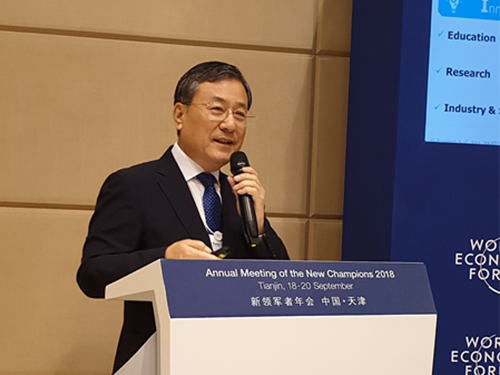 President Shin Presents Opportunities & Challenges of the 4IR at the Summer Davos Forum
(President Shin makes a keynote speech at the 2018 Summer Davos Forum in China on Sept.20.)
KAIST co-hosted the Asia Session with the World Economic Forum during the 2018 Summer Davos Forum in Tianjin, China from September 18 through 20. The session highlighted regional collaboration in Asia to promote inclusive growth in the Fourth Industrial Revolution.
KAIST is working closely with the WEF to take the lead in the Fourth Industrial Revolution. Last July, KAIST established the Fourth Industrial Revolution Information Center (FIRIC) at the KAIST Institute and signed an MOU with the Center for the Fourth Industrial Revolution (C4IR) at the WEF in October. The session is a follow-up event KAIST and the C4IR agreed to last year during the Roundtable Session held in Seoul.
Many experts in new emerging industries as well as many project directors, including Director Murat Sonmez of the C4IR, attended the session KAIST hosted. Director Chizuru Suga at the C4IR in Japan, Director Danil Kerimi in China, and Director Shailesh Sharda in India also attended the session and discussed ways to expand collaboration and networks among the countries.
In his keynote speech at the session on September 20, President Sung-Chul Shin presented how the Korean government is trying to drive the economy by strategically investing in focused industries in the new global industrial environment. President Shin introduced the government’s strategic roadmap to build the competitiveness of emerging technologies such as AI, blockchain, and precision medicine.
He also stressed that the three components of innovation, collaboration, and speed should be prioritized in all sectors for the successful realization of the Fourth Industrial Revolution. For instance, innovation in education, research, and technology commercialization, expansive domestic and international collaboration beyond the private and public sectors, speedy deregulation, and efficient governance will all be critical.
He also said that KAIST will launch new pilot collaboration projects along with the WEF soon. “We paved the way for leading the network with major countries including Japan and India for advancing the Fourth Industrial Revolution through this session,” President Shin said.
2018.09.21 View 8771
President Shin Presents Opportunities & Challenges of the 4IR at the Summer Davos Forum
(President Shin makes a keynote speech at the 2018 Summer Davos Forum in China on Sept.20.)
KAIST co-hosted the Asia Session with the World Economic Forum during the 2018 Summer Davos Forum in Tianjin, China from September 18 through 20. The session highlighted regional collaboration in Asia to promote inclusive growth in the Fourth Industrial Revolution.
KAIST is working closely with the WEF to take the lead in the Fourth Industrial Revolution. Last July, KAIST established the Fourth Industrial Revolution Information Center (FIRIC) at the KAIST Institute and signed an MOU with the Center for the Fourth Industrial Revolution (C4IR) at the WEF in October. The session is a follow-up event KAIST and the C4IR agreed to last year during the Roundtable Session held in Seoul.
Many experts in new emerging industries as well as many project directors, including Director Murat Sonmez of the C4IR, attended the session KAIST hosted. Director Chizuru Suga at the C4IR in Japan, Director Danil Kerimi in China, and Director Shailesh Sharda in India also attended the session and discussed ways to expand collaboration and networks among the countries.
In his keynote speech at the session on September 20, President Sung-Chul Shin presented how the Korean government is trying to drive the economy by strategically investing in focused industries in the new global industrial environment. President Shin introduced the government’s strategic roadmap to build the competitiveness of emerging technologies such as AI, blockchain, and precision medicine.
He also stressed that the three components of innovation, collaboration, and speed should be prioritized in all sectors for the successful realization of the Fourth Industrial Revolution. For instance, innovation in education, research, and technology commercialization, expansive domestic and international collaboration beyond the private and public sectors, speedy deregulation, and efficient governance will all be critical.
He also said that KAIST will launch new pilot collaboration projects along with the WEF soon. “We paved the way for leading the network with major countries including Japan and India for advancing the Fourth Industrial Revolution through this session,” President Shin said.
2018.09.21 View 8771 -
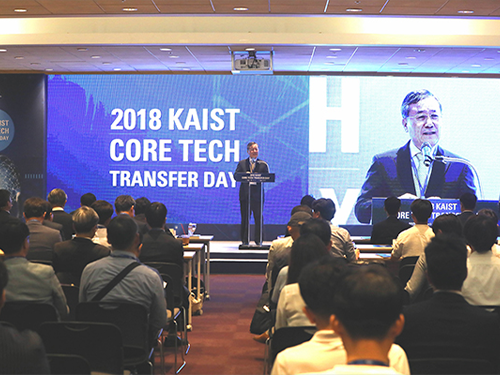 KAIST Core Technology Fair Accelerates Commercialization
(President Shin makes opening remarks at the KAIST Core Tech Transfer Day in Seoul.)
Technology commercialization is the one of the innovation initiatives KAIST is strongly driving. KAIST showcased six core technologies developed by KAIST research teams during the 2018 KAIST Core Tech Transfer Day on September 10 at Coex in Seoul. More than 300 investors, buyers, and venture capitalists showed up for the fair. This is the second fair organized as one of the strategic innovation initiatives that KAIST is promoting.
Developers of key technologies selected in the fields of bio, nano, AI, and semiconductors presented their distinct technological prowess to the attendees. The technologies are highly relevant for the new industrial environment trends in the Fourth Industrial Revolution.
The 15-member committee comprised of patent attorneys, venture capitalists, and commercialization specialists selected the six core technologies based on their innovativeness, applicability, and marketability. The Office of University-Industry Cooperation (OUIC) plans to offer buyers various services for developing business models, business strategy analysis, and marketing at home and abroad. The six core technologies featured at the fair include:
- Novel technology of a nano patterning platform by Professor Hee Tae Chung from the Department of Chemical and Biomolecular Engineering
- Anticancer therapeutic candidate materials strengthening immune function by Professor Byung Sok Choi from the Department of Chemistry
- Biofuel mass production using micro-organisms by Distinguished Professor Sang-Yup Lee from the Department of Chemical and Biomolecular Engineering
- Compact single-shot hyperspectral camera technology by Min Hyuk Kim from the School of Computing
- AI-powered high speed ultra-high definition upscaling technology by Professor Munchurl Kim from the School of Electrical Engineering - A radiation strong MOSFET device by Hee Chul Lee from the School of Electrical Engineering
President Sung-Chul Shin stressed in his opening remarks that universities should make contributions to economic development through innovation. “Global leading universities are taking an instrumental role in creating new jobs and economic growth with their own technologies. KAIST, as the leading university in Korea, is accelerating the commercialization of technology produced internally to create a meaningful impact for the economy as well as the job market beyond Korea,” he said.
“We are aiming for the global market, not just in Korea. I want KAIST to be a global value creator that can contribute to the betterment of the world through our innovations,” he added.
2018.09.10 View 6770
KAIST Core Technology Fair Accelerates Commercialization
(President Shin makes opening remarks at the KAIST Core Tech Transfer Day in Seoul.)
Technology commercialization is the one of the innovation initiatives KAIST is strongly driving. KAIST showcased six core technologies developed by KAIST research teams during the 2018 KAIST Core Tech Transfer Day on September 10 at Coex in Seoul. More than 300 investors, buyers, and venture capitalists showed up for the fair. This is the second fair organized as one of the strategic innovation initiatives that KAIST is promoting.
Developers of key technologies selected in the fields of bio, nano, AI, and semiconductors presented their distinct technological prowess to the attendees. The technologies are highly relevant for the new industrial environment trends in the Fourth Industrial Revolution.
The 15-member committee comprised of patent attorneys, venture capitalists, and commercialization specialists selected the six core technologies based on their innovativeness, applicability, and marketability. The Office of University-Industry Cooperation (OUIC) plans to offer buyers various services for developing business models, business strategy analysis, and marketing at home and abroad. The six core technologies featured at the fair include:
- Novel technology of a nano patterning platform by Professor Hee Tae Chung from the Department of Chemical and Biomolecular Engineering
- Anticancer therapeutic candidate materials strengthening immune function by Professor Byung Sok Choi from the Department of Chemistry
- Biofuel mass production using micro-organisms by Distinguished Professor Sang-Yup Lee from the Department of Chemical and Biomolecular Engineering
- Compact single-shot hyperspectral camera technology by Min Hyuk Kim from the School of Computing
- AI-powered high speed ultra-high definition upscaling technology by Professor Munchurl Kim from the School of Electrical Engineering - A radiation strong MOSFET device by Hee Chul Lee from the School of Electrical Engineering
President Sung-Chul Shin stressed in his opening remarks that universities should make contributions to economic development through innovation. “Global leading universities are taking an instrumental role in creating new jobs and economic growth with their own technologies. KAIST, as the leading university in Korea, is accelerating the commercialization of technology produced internally to create a meaningful impact for the economy as well as the job market beyond Korea,” he said.
“We are aiming for the global market, not just in Korea. I want KAIST to be a global value creator that can contribute to the betterment of the world through our innovations,” he added.
2018.09.10 View 6770 -
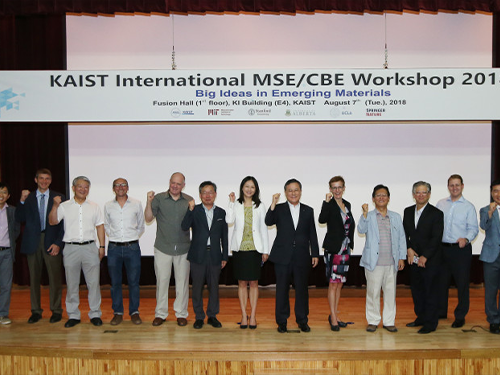 The MSE/CBE Int'l Workshop Explores Big Ideas in Emerging Materials
(KAIST President Sung-Chul Shin with scholars participated in the workshop)
The MSE/CBE International Workshop brought together editors from key academic journals in multidisciplinary materials science and scholars from leading universities at KAIST on Aug. 7.
The workshop hosted ten distinguished speakers in the fields of nanostructures for next-generation emerging applications, chemical and bio-engineering, and materials innovation for functional applications. They explored opportunities and challenges for reinventing novel materials that will solve complex problems.
(From left: Professor Buriak, Professor Swager and Professor Il-Doo Kim)
Speakers included: Chief Editor of Nature Materials Vincent Dusastre; Editor-in- Chief of ACS NANO and professor at UCLA Paul S. Weiss; Jillian M. Buriak, Editor-in-Chief of Chemistry of Materials; Associate Editor of Macromolecules and professor at MIT Timothy M. Swager; Coordinating Editor of Acta Materialia and Head of the Department of Materials Science and Engineering at MIT Christopher A. Schuh; Editor-in-Chief of Biotechnology Journal and Metabolic Engineering and Distinguished Professor at KAIST Sang-Yup Lee; Associate Editor of Energy Storage Materials and professor at KAIST Sang Ouk Kim; Professor Jeffrey C. Grossman at MIT; Professor Zhenan Bao at Stanford University; and Professor Hyuck Mo Lee, head of the Department of Materials Science and Engineering at KAIST.
Interdisciplinary materials research holds the key to building technological competitiveness in many industrial sectors extending from energy, environment, and health care to medicine and beyond. It has also been the bedrock of KAIST’s scholarship and research innovation. More than 200 faculty members in the field of materials science produce about 800 SCI papers every year. The two departments of materials science and chemical biomolecular engineering are leading KAIST’s global reputation, as they were both ranked 13th and 14th in the QS World University Ranking by Subject this year.
(Professor Il-Doo Kim fromt he Department of Materials Science Engineering)
Professor Il-Doo Kim from the Department of Materials Science Engineering has been the chair of this workshop from 2016. In hosting the second one this year, he said that he hopes this year’s workshop will inspire many materials scientists to have big ideas and work to make those big ideas get noticed in order to have a real impact.
(KAIST President Sung-Chul Shin)
President Sung-Chul Shin, who is a physicist specializing in materials physics, expressed his keen interest in the workshop, saying innovative materials made of unthinkable and noble combinations will be the key factor in determining the competitiveness of new technology and new industries. He lauded international collaborations for making new materials and the scholarly passion to evaluate the materials’ characteristics that made this significant progress possible.
Dr. Vincent Dusastre, chief editor of Nature Materials, presented recent trends in materials for energy. He described how the rational design and improvement of materials’ properties can lead to energy alternatives which will compete with existing technologies. He pointed out that given the dramatic fundamental and practical breakthroughs that are taking place in the realization of solar cells with high energy-conversion efficiency, the improvement of batteries for electric vehicles and the grid is also a major challenge. He stressed, “Key advances in sustainable approaches beyond Li-ion batteries and control of redox processes are also greatly needed.”
Meanwhile, ACS NANO Editor-in-Chief Paul S. Weiss spoke on the importance of heterogeneity in the structure and function of molecules and nanoscale assemblies. He stressed that such extensiveness of multi-interdisciplinary research will accelerate a greater impact as indicated when the fields of neuroscience and microbiome converged with nanoscience and nanotechnology.
Editor-in-Chief of Chemistry of Materials Professor Jillian M. Buriak from the University of Alberta described how predictive models and machine learning can replace time consuming empirical device production and screening. By understanding and pinpointing the frustrating bottlenecks in the design of stable and efficient organic photovoltaics, much faster throughput can be obtained to enable a more direct pathway to stability, efficiency, and finally commercialization.
2018.08.13 View 13221
The MSE/CBE Int'l Workshop Explores Big Ideas in Emerging Materials
(KAIST President Sung-Chul Shin with scholars participated in the workshop)
The MSE/CBE International Workshop brought together editors from key academic journals in multidisciplinary materials science and scholars from leading universities at KAIST on Aug. 7.
The workshop hosted ten distinguished speakers in the fields of nanostructures for next-generation emerging applications, chemical and bio-engineering, and materials innovation for functional applications. They explored opportunities and challenges for reinventing novel materials that will solve complex problems.
(From left: Professor Buriak, Professor Swager and Professor Il-Doo Kim)
Speakers included: Chief Editor of Nature Materials Vincent Dusastre; Editor-in- Chief of ACS NANO and professor at UCLA Paul S. Weiss; Jillian M. Buriak, Editor-in-Chief of Chemistry of Materials; Associate Editor of Macromolecules and professor at MIT Timothy M. Swager; Coordinating Editor of Acta Materialia and Head of the Department of Materials Science and Engineering at MIT Christopher A. Schuh; Editor-in-Chief of Biotechnology Journal and Metabolic Engineering and Distinguished Professor at KAIST Sang-Yup Lee; Associate Editor of Energy Storage Materials and professor at KAIST Sang Ouk Kim; Professor Jeffrey C. Grossman at MIT; Professor Zhenan Bao at Stanford University; and Professor Hyuck Mo Lee, head of the Department of Materials Science and Engineering at KAIST.
Interdisciplinary materials research holds the key to building technological competitiveness in many industrial sectors extending from energy, environment, and health care to medicine and beyond. It has also been the bedrock of KAIST’s scholarship and research innovation. More than 200 faculty members in the field of materials science produce about 800 SCI papers every year. The two departments of materials science and chemical biomolecular engineering are leading KAIST’s global reputation, as they were both ranked 13th and 14th in the QS World University Ranking by Subject this year.
(Professor Il-Doo Kim fromt he Department of Materials Science Engineering)
Professor Il-Doo Kim from the Department of Materials Science Engineering has been the chair of this workshop from 2016. In hosting the second one this year, he said that he hopes this year’s workshop will inspire many materials scientists to have big ideas and work to make those big ideas get noticed in order to have a real impact.
(KAIST President Sung-Chul Shin)
President Sung-Chul Shin, who is a physicist specializing in materials physics, expressed his keen interest in the workshop, saying innovative materials made of unthinkable and noble combinations will be the key factor in determining the competitiveness of new technology and new industries. He lauded international collaborations for making new materials and the scholarly passion to evaluate the materials’ characteristics that made this significant progress possible.
Dr. Vincent Dusastre, chief editor of Nature Materials, presented recent trends in materials for energy. He described how the rational design and improvement of materials’ properties can lead to energy alternatives which will compete with existing technologies. He pointed out that given the dramatic fundamental and practical breakthroughs that are taking place in the realization of solar cells with high energy-conversion efficiency, the improvement of batteries for electric vehicles and the grid is also a major challenge. He stressed, “Key advances in sustainable approaches beyond Li-ion batteries and control of redox processes are also greatly needed.”
Meanwhile, ACS NANO Editor-in-Chief Paul S. Weiss spoke on the importance of heterogeneity in the structure and function of molecules and nanoscale assemblies. He stressed that such extensiveness of multi-interdisciplinary research will accelerate a greater impact as indicated when the fields of neuroscience and microbiome converged with nanoscience and nanotechnology.
Editor-in-Chief of Chemistry of Materials Professor Jillian M. Buriak from the University of Alberta described how predictive models and machine learning can replace time consuming empirical device production and screening. By understanding and pinpointing the frustrating bottlenecks in the design of stable and efficient organic photovoltaics, much faster throughput can be obtained to enable a more direct pathway to stability, efficiency, and finally commercialization.
2018.08.13 View 13221 -
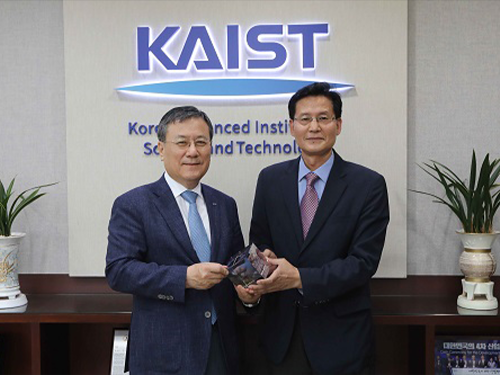 AST Holdings Makes a Donation to KAIST
(KAIST President Sung-Chul Shin and the CEO of AST Holdings, Haegyoo Seo)
KAIST President Sung-Chul Shin and the CEO of AST Holdings, Haegyoo Seo, agreed to a partnership on June 27 at the main campus of KAIST.
AST Holdings donated one hundred million KRW to the school for fostering experts in the field of augmented reality (AR). The fund will also go to joint research on AR technologies required smart cities.
AST Holdings, established in 1997, specializes in developing VR/AR contents. It has collaborated with Samsung Electronics and KIA Motors to produce various digital contents and develop solutions using VR/AR.
Research and development carried out by the Augmented Reality Research Center (ARRC) of KAIST aims to foster talented manpower and has accumulated crucial components of technology for contributing to research dissemination.
In particular, the ARRC established an industrial, academic, and research partnership that has suggested a new standard for industrial-academic joint research. Under this agreement, an industry assigns its staff to the research center to obtain new technical capabilities while the center strengthens the technological application of a study based on the industrial needs.
Through the partnership funds, the center can provide a stable research environment for young researchers and recruit talented manpower from around the world. The center has the potential to become a new model of industrial-academic research platforms that will take a leading role in the field of VR/AR.
CEO Seo said, “I would like to take the lead in research on VR/AR-based futuristic city platforms through this partnership with KAIST ARRC and the industrial-academic research program. I hope that this partnership between our company and KAIST will create synergy and secure crucial research, manpower, and basic technology according to our company’s needs.
President Shin added, “KAIST will pursue creating an exemplary case of industrial-academic cooperation with outstanding national and international manpower.”
2018.07.02 View 4920
AST Holdings Makes a Donation to KAIST
(KAIST President Sung-Chul Shin and the CEO of AST Holdings, Haegyoo Seo)
KAIST President Sung-Chul Shin and the CEO of AST Holdings, Haegyoo Seo, agreed to a partnership on June 27 at the main campus of KAIST.
AST Holdings donated one hundred million KRW to the school for fostering experts in the field of augmented reality (AR). The fund will also go to joint research on AR technologies required smart cities.
AST Holdings, established in 1997, specializes in developing VR/AR contents. It has collaborated with Samsung Electronics and KIA Motors to produce various digital contents and develop solutions using VR/AR.
Research and development carried out by the Augmented Reality Research Center (ARRC) of KAIST aims to foster talented manpower and has accumulated crucial components of technology for contributing to research dissemination.
In particular, the ARRC established an industrial, academic, and research partnership that has suggested a new standard for industrial-academic joint research. Under this agreement, an industry assigns its staff to the research center to obtain new technical capabilities while the center strengthens the technological application of a study based on the industrial needs.
Through the partnership funds, the center can provide a stable research environment for young researchers and recruit talented manpower from around the world. The center has the potential to become a new model of industrial-academic research platforms that will take a leading role in the field of VR/AR.
CEO Seo said, “I would like to take the lead in research on VR/AR-based futuristic city platforms through this partnership with KAIST ARRC and the industrial-academic research program. I hope that this partnership between our company and KAIST will create synergy and secure crucial research, manpower, and basic technology according to our company’s needs.
President Shin added, “KAIST will pursue creating an exemplary case of industrial-academic cooperation with outstanding national and international manpower.”
2018.07.02 View 4920 -
 ICT Volunteer Corps Off to Africa
A volunteer corps made up of students will take part in ICT education services in Ethiopia, Tanzania, and Uganda. KAIST students have been volunteering with the ICT education program in Africa since 2015.
The volunteer corps will be made up of 51 students from 13 teams and will be conducting services for a month through the end of July at Addis Ababa Institute of Technology (AAiT) in Ethiopia, Nelson Mandela African Institute of Science and Technology (NM-AIST) and Star High School in Tanzania, and IT Education Center in Uganda.
In Tanzania, KAIST students teamed up with NM-AIST students to carry out appropriate technology programs applied with Arduino kits. They plan to use scientific and engineering approaches to address local residents’ living challenges such as developing agricultural water suppliers using sensors measuring water in the soil and oxygen suppliers in the reservoir.
Meanwhile, in Ethiopia and Uganda, student volunteers will be involved in various ICT educational programs for local students. The volunteering corps will also introduce cultural programs including K-Pop dancing for young students there. They will also engage in sports and art classes for students at orphanages in the region.
President Sung-Chul Shin encouraged volunteers at the kick-off ceremony saying, “KAIST students should keep always humility, warmth, and tolerance in mind. I believe our students will exert leadership out there along with knowledge as well as wisdom.”
2018.07.02 View 7425
ICT Volunteer Corps Off to Africa
A volunteer corps made up of students will take part in ICT education services in Ethiopia, Tanzania, and Uganda. KAIST students have been volunteering with the ICT education program in Africa since 2015.
The volunteer corps will be made up of 51 students from 13 teams and will be conducting services for a month through the end of July at Addis Ababa Institute of Technology (AAiT) in Ethiopia, Nelson Mandela African Institute of Science and Technology (NM-AIST) and Star High School in Tanzania, and IT Education Center in Uganda.
In Tanzania, KAIST students teamed up with NM-AIST students to carry out appropriate technology programs applied with Arduino kits. They plan to use scientific and engineering approaches to address local residents’ living challenges such as developing agricultural water suppliers using sensors measuring water in the soil and oxygen suppliers in the reservoir.
Meanwhile, in Ethiopia and Uganda, student volunteers will be involved in various ICT educational programs for local students. The volunteering corps will also introduce cultural programs including K-Pop dancing for young students there. They will also engage in sports and art classes for students at orphanages in the region.
President Sung-Chul Shin encouraged volunteers at the kick-off ceremony saying, “KAIST students should keep always humility, warmth, and tolerance in mind. I believe our students will exert leadership out there along with knowledge as well as wisdom.”
2018.07.02 View 7425 -
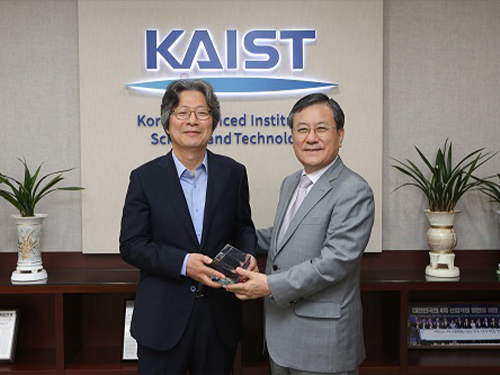 Distinguished Professor Koh Donates His Ho-Am Prize Money
(From left: Distinguished Professor Gou Young Koh and KAIST President Sung-Chul Shin)
Distinguished Professor Gou Young Koh from the Graduate School of Medical Science and Engineering donated one hundred million KRW to KAIST that he received for winning the Ho-Am Prize.
Professor Koh, who is widely renowned for angiogenesis, was appointed as the 2018 laureate of the 28th Ho-Am Prize for demonstrating the effective reduction of tumor progression and metastasis via tumor vessel normalization.
He made the donation to the Graduate School of Medical Science and Engineering, where he conducted his research. “As a basic medical scientist, it is my great honor to receive this prize for the recognition of my research outcome. I will give impetus to research for continuous development,” Professor Koh said.
Professor Koh also received the 5th Asan Award in Medicine in 2012 and the 7th Kyung-Ahm Award in 2011. He was also the awardee of the 17th Wunsch Medical Award. He has donated cash prizes to the school every time he is awarded.
KAIST President Sung-Chul Shin said, “I would like to express my gratitude to the professor for his generous donation to the school. It will be a great help fostering outstanding medical scientists.
Professor Koh received his MD-PhD from the Medical School of Chonbuk National University. After finishing his post-doctoral program at Cornell University and Indiana State University, he was appointed as a professor at Chonbuk National University and POSTECH. Currently, he holds the position of distinguished professor at KAIST and director of the IBS Center for Vascular Research.
2018.06.20 View 6091
Distinguished Professor Koh Donates His Ho-Am Prize Money
(From left: Distinguished Professor Gou Young Koh and KAIST President Sung-Chul Shin)
Distinguished Professor Gou Young Koh from the Graduate School of Medical Science and Engineering donated one hundred million KRW to KAIST that he received for winning the Ho-Am Prize.
Professor Koh, who is widely renowned for angiogenesis, was appointed as the 2018 laureate of the 28th Ho-Am Prize for demonstrating the effective reduction of tumor progression and metastasis via tumor vessel normalization.
He made the donation to the Graduate School of Medical Science and Engineering, where he conducted his research. “As a basic medical scientist, it is my great honor to receive this prize for the recognition of my research outcome. I will give impetus to research for continuous development,” Professor Koh said.
Professor Koh also received the 5th Asan Award in Medicine in 2012 and the 7th Kyung-Ahm Award in 2011. He was also the awardee of the 17th Wunsch Medical Award. He has donated cash prizes to the school every time he is awarded.
KAIST President Sung-Chul Shin said, “I would like to express my gratitude to the professor for his generous donation to the school. It will be a great help fostering outstanding medical scientists.
Professor Koh received his MD-PhD from the Medical School of Chonbuk National University. After finishing his post-doctoral program at Cornell University and Indiana State University, he was appointed as a professor at Chonbuk National University and POSTECH. Currently, he holds the position of distinguished professor at KAIST and director of the IBS Center for Vascular Research.
2018.06.20 View 6091 -
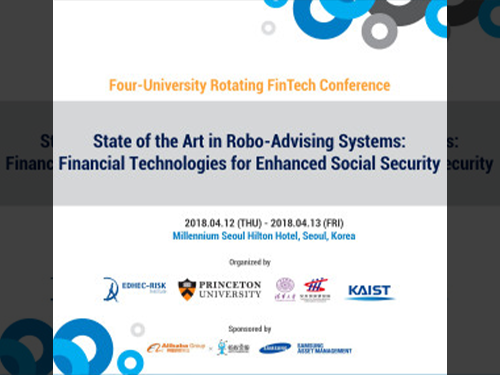 KAIST to Host FinTech Conference 2018
KAIST will be hosting a FinTech Conference with Princeton University (USA), Tsinghua University (China), and EDHEC Business School (France) in Seoul from April 12 to 13 titled State of the Art in Robo-Advising Systems: Financial Technologies for Enhanced Social Security.
The Bendhein Center for Finance and Department of Operations Research and Financial Engineering from Princeton University, Fintech Lab from Tsinghua University, and the Risk Institute from EDHEC will participate as co-hosting organizations in this conference organized by the Department of Industrial & Systems Engineering and the KAIST Center for Wealth Management Technologies.
The conference will discuss issues required for providing customized asset management to the public in terms of theory, technology, and industry.
During the conference, KAIST President Sung-Chul Shin and Chairman and CEO of the National Pension Service Sung Joo Kim will deliver welcoming addresses.
Professor John Mulvey from Princeton University, Professor Michael Dempster from Cambridge University, Professors Wei Xu and Changle Lin from Tsinghua University, Professor Lionel Martellini from EDHEC, and Professor Woo Chang Kim from KAIST are some of the invited speakers at the event.
Moreover, renowned experts in related fields will also participate in the conference, including Founder of Vanguard Group John Bogle, Jin Lee from Ant Financial, Youngsuh Cho from Shinhan Financial Group, Jung-Hwan Lee from Samsung Asset Management, and Hye Young Sung from the National Pension Service Research Institute.
Professor Kim said, “Only a small number of wealthy people can receive life-cycle customized asset management services due to the high cost structure; however, new technology derived from the Fourth Industrial Revolution can reduce the service price in an innovative manner, ultimately leading it to be popularized.”
“In an era with the poverty rate of older people reaching almost 50%.Fintech can enable individuals to manage their assets in an active manner, reinforcing social security without additional social costs in the period,” he added.
These four universities have been hosting the FinTech Conference since 2017. China will host the conference this fall, followed by France next year.
Samsung Asset Management, Alibaba Group, and Ant Financial will sponsor the conference. Anyone interested in this event can find more details at http://wmt.kaist.ac.kr/conference.html.
2018.04.02 View 8768
KAIST to Host FinTech Conference 2018
KAIST will be hosting a FinTech Conference with Princeton University (USA), Tsinghua University (China), and EDHEC Business School (France) in Seoul from April 12 to 13 titled State of the Art in Robo-Advising Systems: Financial Technologies for Enhanced Social Security.
The Bendhein Center for Finance and Department of Operations Research and Financial Engineering from Princeton University, Fintech Lab from Tsinghua University, and the Risk Institute from EDHEC will participate as co-hosting organizations in this conference organized by the Department of Industrial & Systems Engineering and the KAIST Center for Wealth Management Technologies.
The conference will discuss issues required for providing customized asset management to the public in terms of theory, technology, and industry.
During the conference, KAIST President Sung-Chul Shin and Chairman and CEO of the National Pension Service Sung Joo Kim will deliver welcoming addresses.
Professor John Mulvey from Princeton University, Professor Michael Dempster from Cambridge University, Professors Wei Xu and Changle Lin from Tsinghua University, Professor Lionel Martellini from EDHEC, and Professor Woo Chang Kim from KAIST are some of the invited speakers at the event.
Moreover, renowned experts in related fields will also participate in the conference, including Founder of Vanguard Group John Bogle, Jin Lee from Ant Financial, Youngsuh Cho from Shinhan Financial Group, Jung-Hwan Lee from Samsung Asset Management, and Hye Young Sung from the National Pension Service Research Institute.
Professor Kim said, “Only a small number of wealthy people can receive life-cycle customized asset management services due to the high cost structure; however, new technology derived from the Fourth Industrial Revolution can reduce the service price in an innovative manner, ultimately leading it to be popularized.”
“In an era with the poverty rate of older people reaching almost 50%.Fintech can enable individuals to manage their assets in an active manner, reinforcing social security without additional social costs in the period,” he added.
These four universities have been hosting the FinTech Conference since 2017. China will host the conference this fall, followed by France next year.
Samsung Asset Management, Alibaba Group, and Ant Financial will sponsor the conference. Anyone interested in this event can find more details at http://wmt.kaist.ac.kr/conference.html.
2018.04.02 View 8768 -
 Open Online Course in Science and Technology, STAR-MOOC
Four universities specializing in science and technology, along with POSTECH and UST, teamed up to establish programs for innovation in education programs, responding to the Fourth Industrial Revolution.
KAIST held an opening ceremony for the Science & Technology Advanced Research - Massive Open Online Course (STAR-MOOC) and signed an MoU with GIST, DGIST, UNIST, POSTECH, and UST.
STAR-MOOC was launched on February 26 to provide educational service to the public. It is a joint platform where people can take courses featuring lectures from professors from universities specializing in science and technology as well as national research universities.
It offers 15 courses covering basics, majors, and electives related to science and technology developed by the STAR-MOOC committee. Students can take a variety of courses.
At the opening ceremony, KAIST President Sung-Chul Shin, DGIST President Sang Hyuk Son, UST President Kil Choo Moon, POSTECH Vice President Wankyun Chung, UNIST Vice President Jae Sung Lee, GIST Vice President of Public Affairs Pil-hwan Park came to sign the MoU for provising educational services for the public.
During the ceremony, there was also time to introduce a technical agreement with a non-profit organization founded by NAVER, the CONNECT Foundation, for its courses and platform.
Universities participating in STAR-MOOC will put effort into capacity building in response to changes driven by the Fourth Industrial Revolution.
President Shin said, “STAR-MOOC is a platform that provides science and technology courses from basics to electives and major courses. It will become a leading educational platform.”
Students can register and choose courses from the website (http://starmooc.kr).
2018.03.19 View 9078
Open Online Course in Science and Technology, STAR-MOOC
Four universities specializing in science and technology, along with POSTECH and UST, teamed up to establish programs for innovation in education programs, responding to the Fourth Industrial Revolution.
KAIST held an opening ceremony for the Science & Technology Advanced Research - Massive Open Online Course (STAR-MOOC) and signed an MoU with GIST, DGIST, UNIST, POSTECH, and UST.
STAR-MOOC was launched on February 26 to provide educational service to the public. It is a joint platform where people can take courses featuring lectures from professors from universities specializing in science and technology as well as national research universities.
It offers 15 courses covering basics, majors, and electives related to science and technology developed by the STAR-MOOC committee. Students can take a variety of courses.
At the opening ceremony, KAIST President Sung-Chul Shin, DGIST President Sang Hyuk Son, UST President Kil Choo Moon, POSTECH Vice President Wankyun Chung, UNIST Vice President Jae Sung Lee, GIST Vice President of Public Affairs Pil-hwan Park came to sign the MoU for provising educational services for the public.
During the ceremony, there was also time to introduce a technical agreement with a non-profit organization founded by NAVER, the CONNECT Foundation, for its courses and platform.
Universities participating in STAR-MOOC will put effort into capacity building in response to changes driven by the Fourth Industrial Revolution.
President Shin said, “STAR-MOOC is a platform that provides science and technology courses from basics to electives and major courses. It will become a leading educational platform.”
Students can register and choose courses from the website (http://starmooc.kr).
2018.03.19 View 9078 -
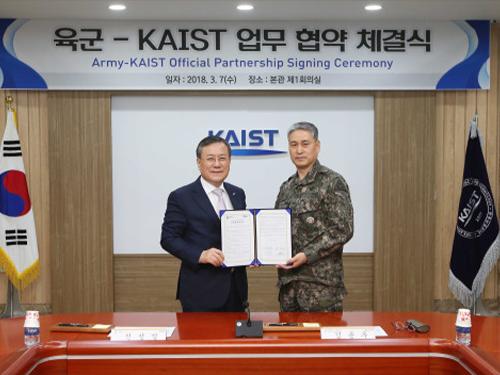 MoU Signed by the Republic of Korea Army and KAIST
(From left: KAIST President Sung-Chul Shin and ROKA Chief of Staff Youngwoo Kim)
On March 7, the Republic of Korea Army (ROKA) and KAIST signed an MoU and opened special sessions dedicated to the army in order to reinforce research and development capacities.
The close partnership between KAIST and ROKA will provide an opportunity to establish advanced combat development systems.
Through the MoU, signed by KAIST President Sung-Chul Shin and ROKA Chief of Staff Youngwoo Kim, both organizations will discuss new opportunities for cooperation between academia and military and establish an institute and its curriculum.
KAIST is offering special sessions for the army March 5-9, where about 150 executives from ROKA, including the headquarters, education and training command, and logistics command, will participate.
These session are expected to enhance the army’s capabilities through education on cutting-edge equipment that will emerge during the Fourth Industrial Revolution.
The director of the KAIST Security Convergence Institute, Soo Hyun Kim, said, “KAIST and ROKA will plan and operate various programs together though this partnership as well as special sessions. I hope this cooperation will be an opportunity to enhance the combat development of ROKA.”
2018.03.07 View 6763
MoU Signed by the Republic of Korea Army and KAIST
(From left: KAIST President Sung-Chul Shin and ROKA Chief of Staff Youngwoo Kim)
On March 7, the Republic of Korea Army (ROKA) and KAIST signed an MoU and opened special sessions dedicated to the army in order to reinforce research and development capacities.
The close partnership between KAIST and ROKA will provide an opportunity to establish advanced combat development systems.
Through the MoU, signed by KAIST President Sung-Chul Shin and ROKA Chief of Staff Youngwoo Kim, both organizations will discuss new opportunities for cooperation between academia and military and establish an institute and its curriculum.
KAIST is offering special sessions for the army March 5-9, where about 150 executives from ROKA, including the headquarters, education and training command, and logistics command, will participate.
These session are expected to enhance the army’s capabilities through education on cutting-edge equipment that will emerge during the Fourth Industrial Revolution.
The director of the KAIST Security Convergence Institute, Soo Hyun Kim, said, “KAIST and ROKA will plan and operate various programs together though this partnership as well as special sessions. I hope this cooperation will be an opportunity to enhance the combat development of ROKA.”
2018.03.07 View 6763 -
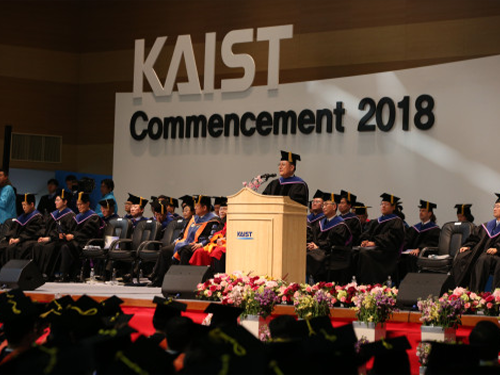 The 2018 Commencement of KAIST at a Glance
KAIST awarded a total of 2, 736 degrees at the 2018 commencement ceremony on February 23. Among the honorees, Chairman and CEO of Samsung Electronics and Samsung Advanced Institute of Technology (SAIT) Oh-Hyun Kwon was recognized as the first alumnus honorary doctorate recipient of KAIST.
More than 5,000 family, friends, and graduates including distinguished guests of Minister of Science and ICT Young-Min Yu, the Member of National Assembly Kyung-Jin Kim, Chairman of the KAIST Board of Trustees Jang-Moo Lee, and the Chairperson of the KAIST Development Foundation Soo-Young Lee attended to celebrate the graduates. During the commencement, a total of 2,736 students earned degrees: 644 PhD degrees, 1,352 master’s degrees, and 740 bachelor’s degrees.
(Minister of Science and ICT Young-Min Yu)
(The Member of National Assembly Kyung-Jin Kim)
This year, Chairman and CEO of Samsung Electronics and SAIT Kwon shared the spotlight with many other graduates. Kwon received his Master’s degree in Electrical Engineering from KAIST in 1977 and completed his Ph.D. in Electrical Engineering from Stanford University in 1985. During his more than 33-year career at Samsung, he has made significant contribution to the development of 4M DRAM and the world’s first 64M DRAM. The success of 4M DRAM and 64 DRAM led Samsung to clinch the top position in the DRAM and NAND flash business around the world. This helped Samsung emerge as a global leader in the semiconductor industry.
(From left: Chairman and CEO of Samsung Electronics and SAIT Oh-Hyun Kwon and KAIST President Sung-Chul Shin)
During the commencement speech, Kwon and President Shin both highlighted the importance of collaboration instead of competition.
Kwon encouraged the graduates to understand others to make wonderful synergy. “When you first notice the true value of another person and interact with them, the value of the individual will be doubled and will bring about a greater impact,” he said.
Also, he stressed having a collaborative mindset by saying, “All of you here, including myself, are people who have benefited from society. We must cooperate with each other and give back to society for the vest results.”
While highlighting the core values of KAIST, creativity, challenge and caring, President Shin also emphasized collaboration with others. He said, “In the future, expertise in a single discipline will not lead to new inventions or discoveries. This highlights the importance of multidisciplinary, convergence research. The key to success lies in the acknowledgement of your peers as partners for mutual growth. Your partners will make up your weak areas and become your most important asset. May you expand your personal network by finding valuable partners not only within your laboratory and workplace, but beyond Korea.”
“Go out into the world and change it as a global shaper, global innovator, and global mover. I hope that each and every one of you will add benefits the world and your legacy will be remembered for generations to come. This is your obligation as a graduate of KAIST,” he said.
Click here to view the full text of President Sung-Chul Shin’s address to the graduates
+ List of academically outstanding undergraduate degree recipients who received honors during the Commencement 2018 of KAIST
Award
Department
Winner
Minister of Science and ICT Award
Dept. of Mathematical Sciences
Seong-Hyeok Park
KAIST Board Chairperson Award
School of Computing
Hyeong-Seok Kim
KAIST President Award
Dept. of Chemistry
Hoi-Min Cheong
KAIST Development Foundation Chairperson Award
Dept. of Biological Sciences
Gi-Song Kim
Dept. of Industrial & Systems Engineering
Seung-Hun Lee
2018.02.23 View 12077
The 2018 Commencement of KAIST at a Glance
KAIST awarded a total of 2, 736 degrees at the 2018 commencement ceremony on February 23. Among the honorees, Chairman and CEO of Samsung Electronics and Samsung Advanced Institute of Technology (SAIT) Oh-Hyun Kwon was recognized as the first alumnus honorary doctorate recipient of KAIST.
More than 5,000 family, friends, and graduates including distinguished guests of Minister of Science and ICT Young-Min Yu, the Member of National Assembly Kyung-Jin Kim, Chairman of the KAIST Board of Trustees Jang-Moo Lee, and the Chairperson of the KAIST Development Foundation Soo-Young Lee attended to celebrate the graduates. During the commencement, a total of 2,736 students earned degrees: 644 PhD degrees, 1,352 master’s degrees, and 740 bachelor’s degrees.
(Minister of Science and ICT Young-Min Yu)
(The Member of National Assembly Kyung-Jin Kim)
This year, Chairman and CEO of Samsung Electronics and SAIT Kwon shared the spotlight with many other graduates. Kwon received his Master’s degree in Electrical Engineering from KAIST in 1977 and completed his Ph.D. in Electrical Engineering from Stanford University in 1985. During his more than 33-year career at Samsung, he has made significant contribution to the development of 4M DRAM and the world’s first 64M DRAM. The success of 4M DRAM and 64 DRAM led Samsung to clinch the top position in the DRAM and NAND flash business around the world. This helped Samsung emerge as a global leader in the semiconductor industry.
(From left: Chairman and CEO of Samsung Electronics and SAIT Oh-Hyun Kwon and KAIST President Sung-Chul Shin)
During the commencement speech, Kwon and President Shin both highlighted the importance of collaboration instead of competition.
Kwon encouraged the graduates to understand others to make wonderful synergy. “When you first notice the true value of another person and interact with them, the value of the individual will be doubled and will bring about a greater impact,” he said.
Also, he stressed having a collaborative mindset by saying, “All of you here, including myself, are people who have benefited from society. We must cooperate with each other and give back to society for the vest results.”
While highlighting the core values of KAIST, creativity, challenge and caring, President Shin also emphasized collaboration with others. He said, “In the future, expertise in a single discipline will not lead to new inventions or discoveries. This highlights the importance of multidisciplinary, convergence research. The key to success lies in the acknowledgement of your peers as partners for mutual growth. Your partners will make up your weak areas and become your most important asset. May you expand your personal network by finding valuable partners not only within your laboratory and workplace, but beyond Korea.”
“Go out into the world and change it as a global shaper, global innovator, and global mover. I hope that each and every one of you will add benefits the world and your legacy will be remembered for generations to come. This is your obligation as a graduate of KAIST,” he said.
Click here to view the full text of President Sung-Chul Shin’s address to the graduates
+ List of academically outstanding undergraduate degree recipients who received honors during the Commencement 2018 of KAIST
Award
Department
Winner
Minister of Science and ICT Award
Dept. of Mathematical Sciences
Seong-Hyeok Park
KAIST Board Chairperson Award
School of Computing
Hyeong-Seok Kim
KAIST President Award
Dept. of Chemistry
Hoi-Min Cheong
KAIST Development Foundation Chairperson Award
Dept. of Biological Sciences
Gi-Song Kim
Dept. of Industrial & Systems Engineering
Seung-Hun Lee
2018.02.23 View 12077 -
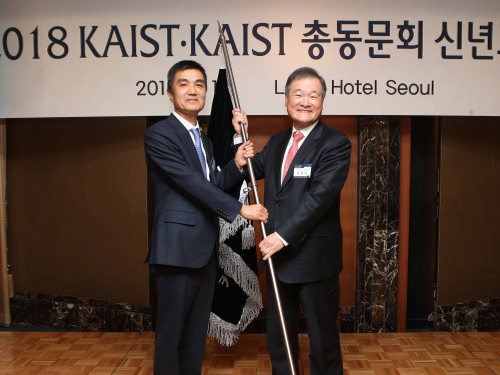 Harnessing the Strength of KAIST Alumni: New Head of KAA Inaugurated
KAIST alumni gathered in Seoul on January 13 to celebrate the New Year and the newly-elected leadership of the KAIST Alumni Association (KAA). More than 300 alumni, including President Sung-Chul Shin who is also an alumnus of KAIST, joined the gala event held at the Lotte Hotel.
Photo: Ki-Chul Cha(left) and Jung Sik Koh(right)
The KAA inaugurated its new president, Ki-Chul Cha, who was preceded by Jung Sik Koh, the former CEO at the Korea Resources Corporation. His term starts from January 2018 to December 2020.
Cha is the CEO of Inbody Co Ltd., a global company specializing in developing and selling medical instruments, such as a body composition analyzers, and medical solutions. He is also an adjunct professor in the Department of Mechanical Engineering at Yonsei University. Cha obtained a master’s degree in Mechanical Engineering at KAIST in 1980, and a Ph.D. in Bioengineering at the University of Utah, before finishing his post-doc fellowship at Harvard Medical School.
Cha plans to explore the idea that alumni engagement, saying, “KAIST stays as a home in the memories of 60,000 alumni. I will dedicate myself to stimulating the alumni association to make KAISTians proud.”
At the gala event, the KAA awarded the Alumni of the Year honor to six alumni who distinguished themselves in the areas of professional achievement, humanitarianism, and public service. They are the Director of Startup KAIST Professor Byoung Yoon Kim; President of LG Chem Ltd and Head of Battery Research and Development Myung Hwan Kim; Director of INNOX Advanced Materials Co., Ltd Kyung Ho Chang; Vice President of the Korea International Trade Association Jung-Kwan Kim; CEO of Samsung Electro-Mechanics Yun-Tae Lee; and CEO of ENF Technology Jinbae Jung.
Photo: President Shin(far right) poses with six awardees of the Distinguished Alumni Award and the former President of KAA, Koh(far left)
2018.01.16 View 11334
Harnessing the Strength of KAIST Alumni: New Head of KAA Inaugurated
KAIST alumni gathered in Seoul on January 13 to celebrate the New Year and the newly-elected leadership of the KAIST Alumni Association (KAA). More than 300 alumni, including President Sung-Chul Shin who is also an alumnus of KAIST, joined the gala event held at the Lotte Hotel.
Photo: Ki-Chul Cha(left) and Jung Sik Koh(right)
The KAA inaugurated its new president, Ki-Chul Cha, who was preceded by Jung Sik Koh, the former CEO at the Korea Resources Corporation. His term starts from January 2018 to December 2020.
Cha is the CEO of Inbody Co Ltd., a global company specializing in developing and selling medical instruments, such as a body composition analyzers, and medical solutions. He is also an adjunct professor in the Department of Mechanical Engineering at Yonsei University. Cha obtained a master’s degree in Mechanical Engineering at KAIST in 1980, and a Ph.D. in Bioengineering at the University of Utah, before finishing his post-doc fellowship at Harvard Medical School.
Cha plans to explore the idea that alumni engagement, saying, “KAIST stays as a home in the memories of 60,000 alumni. I will dedicate myself to stimulating the alumni association to make KAISTians proud.”
At the gala event, the KAA awarded the Alumni of the Year honor to six alumni who distinguished themselves in the areas of professional achievement, humanitarianism, and public service. They are the Director of Startup KAIST Professor Byoung Yoon Kim; President of LG Chem Ltd and Head of Battery Research and Development Myung Hwan Kim; Director of INNOX Advanced Materials Co., Ltd Kyung Ho Chang; Vice President of the Korea International Trade Association Jung-Kwan Kim; CEO of Samsung Electro-Mechanics Yun-Tae Lee; and CEO of ENF Technology Jinbae Jung.
Photo: President Shin(far right) poses with six awardees of the Distinguished Alumni Award and the former President of KAA, Koh(far left)
2018.01.16 View 11334 -
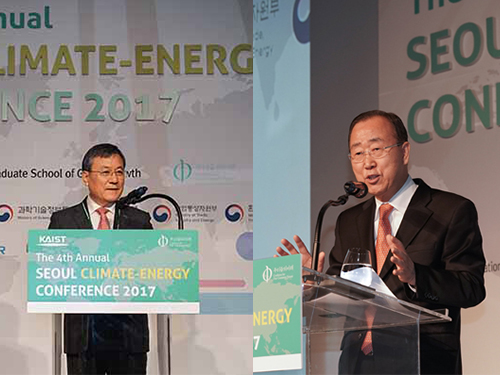 Seoul Climate-Energy Conference Seeks Global Sustainability
(President Shin and Former UN Secretary General at the Seoul Climate Change-Energy Conference)
Global leaders from both the private and public sectors discussed creative ways to seek inclusive green growth and sustainable development at the Seoul Climate-Energy Conference on November 24 in Seoul. The annual conference was co-hosted by KAIST and the Coalition for Our Common Future under the theme “Creating New Momentum for the Paris Agreement and a Sustainable Future.”
More than 100 global leaders participated in the forum including the Director General Frank Rijsbermanof the Global Green Growth Institute and Executive Director Howard Bamsey of the Green Climate Fund. Former UN Secretary-General Ban Ki-Moon, who played a significant role in the signing of the Paris Agreement, was the keynote speaker.
This year’s conference focused on Korea’s low carbon-energy transition and the Fourth Industrial Revolution to be aligned with green growth. At the conference, speakers and participants reviewed the progress of the decisions made by the UN Framework Convention on Climate Change (UNFCCC) COP23 in Bonn, Germany. The conference discussed topics of global collaboration for new climate regimes, green energy infrastructure, the Asia super grid, financing green energy, smart green cities, and new mobility.
President Sung-Chul Shin emphasized global action and greater resilience toward climate change in his opening remarks. He said, “Today’s climate change can be attributed directly to the past three industrial revolutions. As industrialization continues, we must not make future generations pay the cost of this Fourth Industrial Revolution.” He explained that it is increasingly complicated to address climate change and energy issues because even though the use of energy consumption will continue to increase, energy policies are interwoven with global politics.
He stressed three keywords to better address this global problem: innovation, collaboration, and speed. First he emphasized innovation as a priority for future success as it is hard to retain confidence without innovation.
He noted KAIST has made sustainability initiatives in the fields of EEWS (energy, environment, water, sustainability) and green mobility. He also noted the importance of collaboration as industries are moving beyond a single discipline. KAIST is making collaborations in R&D and sustainability sectors, such as Saudi Aramco’s CO2 management center in KAIST. Finally, he explained that the speed of new transformation will be beyond our imagination, and governments should work efficiently to address issues in a fast manner.
Meanwhile, Secretary-General Ban called for global unity in addressing climate change. He strongly emphasized that countries should make agreements not of willingness but of action, and that politicians should realize that this global agenda should be given top priority above domestic politics. He addressed how the world is experiencing the most powerful and destructive effects of climate change which makes active participation in the Paris Agreement increasingly important.
He expressed his concern that the richest and most powerful countries are backing off, emphasizing the role of these countries as both global leaders and top producers of CO2. He also shared his hopes that the OECD will continue to work to fill the absence of the United States, and stressed the importance of acquiring 10 billion USD by 2020 to fund mitigation and adaptation technologies for developing countries’ CO2 emissions.
Click for President Shin's opening remarks
2017.11.29 View 9210
Seoul Climate-Energy Conference Seeks Global Sustainability
(President Shin and Former UN Secretary General at the Seoul Climate Change-Energy Conference)
Global leaders from both the private and public sectors discussed creative ways to seek inclusive green growth and sustainable development at the Seoul Climate-Energy Conference on November 24 in Seoul. The annual conference was co-hosted by KAIST and the Coalition for Our Common Future under the theme “Creating New Momentum for the Paris Agreement and a Sustainable Future.”
More than 100 global leaders participated in the forum including the Director General Frank Rijsbermanof the Global Green Growth Institute and Executive Director Howard Bamsey of the Green Climate Fund. Former UN Secretary-General Ban Ki-Moon, who played a significant role in the signing of the Paris Agreement, was the keynote speaker.
This year’s conference focused on Korea’s low carbon-energy transition and the Fourth Industrial Revolution to be aligned with green growth. At the conference, speakers and participants reviewed the progress of the decisions made by the UN Framework Convention on Climate Change (UNFCCC) COP23 in Bonn, Germany. The conference discussed topics of global collaboration for new climate regimes, green energy infrastructure, the Asia super grid, financing green energy, smart green cities, and new mobility.
President Sung-Chul Shin emphasized global action and greater resilience toward climate change in his opening remarks. He said, “Today’s climate change can be attributed directly to the past three industrial revolutions. As industrialization continues, we must not make future generations pay the cost of this Fourth Industrial Revolution.” He explained that it is increasingly complicated to address climate change and energy issues because even though the use of energy consumption will continue to increase, energy policies are interwoven with global politics.
He stressed three keywords to better address this global problem: innovation, collaboration, and speed. First he emphasized innovation as a priority for future success as it is hard to retain confidence without innovation.
He noted KAIST has made sustainability initiatives in the fields of EEWS (energy, environment, water, sustainability) and green mobility. He also noted the importance of collaboration as industries are moving beyond a single discipline. KAIST is making collaborations in R&D and sustainability sectors, such as Saudi Aramco’s CO2 management center in KAIST. Finally, he explained that the speed of new transformation will be beyond our imagination, and governments should work efficiently to address issues in a fast manner.
Meanwhile, Secretary-General Ban called for global unity in addressing climate change. He strongly emphasized that countries should make agreements not of willingness but of action, and that politicians should realize that this global agenda should be given top priority above domestic politics. He addressed how the world is experiencing the most powerful and destructive effects of climate change which makes active participation in the Paris Agreement increasingly important.
He expressed his concern that the richest and most powerful countries are backing off, emphasizing the role of these countries as both global leaders and top producers of CO2. He also shared his hopes that the OECD will continue to work to fill the absence of the United States, and stressed the importance of acquiring 10 billion USD by 2020 to fund mitigation and adaptation technologies for developing countries’ CO2 emissions.
Click for President Shin's opening remarks
2017.11.29 View 9210